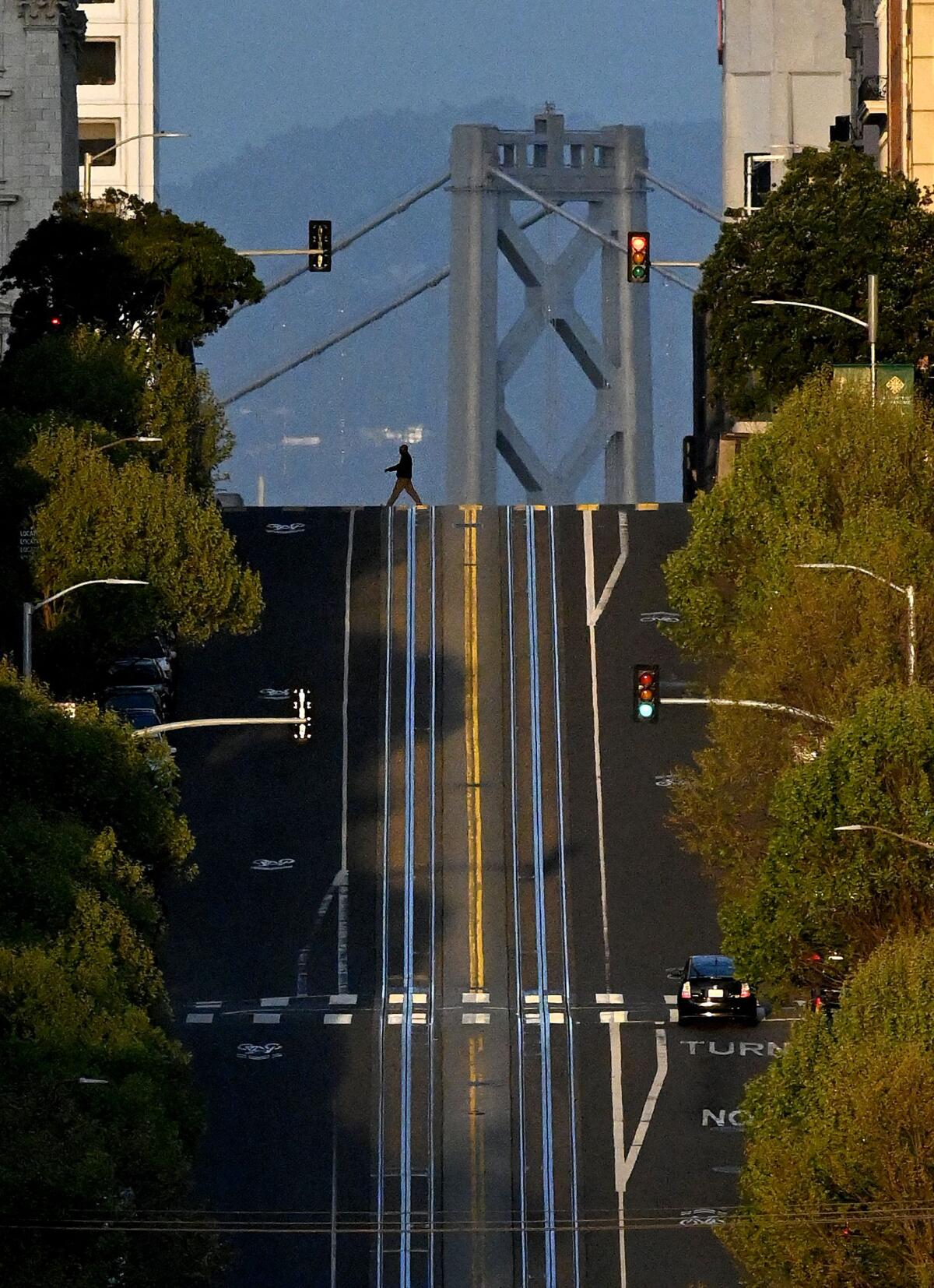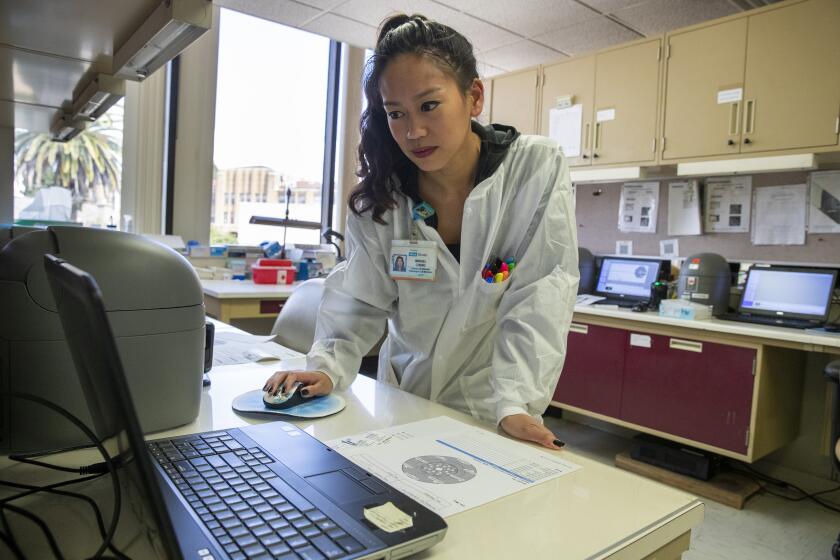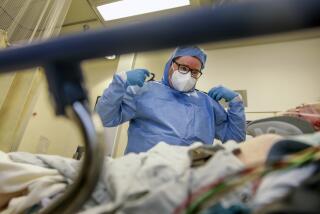How badly will the coronavirus hit San Francisco?
MILLBRAE, Calif. — A top San Francisco health official warned that hospitals still could be overwhelmed with COVID-19 patients, even as officials elsewhere expressed cautious hope the statewide stay-at-home order to stem the spread of the virus was working.
San Francisco has recorded 450 cases and seven deaths, according to The Times coronavirus tracker. By comparison, Los Angeles County has recorded 10 times that amount, while nearby Santa Clara County has recorded more than 1,000 cases and over 30 deaths linked to COVID-19.
“It is simply too early to tell,” Dr. Grant Colfax, San Francisco’s director of public health, said at a news conference Wednesday.
“At this stage of the game, there are still plausible scenarios that our healthcare system could be brought to the brink, and even overwhelmed,” said Colfax, noting that work continues on increasing bed space in hospitals and intensive care units.
His words came a day after the health officer in Contra Costa County warned of the possibility of up to 5,000 deaths a week in California if shelter-in-place orders were pulled too soon. Health officers and city officials have said it’s possible there could be 2,000 to 14,000 coronavirus deaths in Contra Costa County, 1,000 in Ventura County and 2,000 to 16,000 in Santa Clara County.
The same day Colfax issued his warning, six counties in the San Francisco Bay Area extended their shelter-in-place order through at least May 3, and San Francisco Mayor London Breed said it’s possible it might last even longer. Gov. Gavin Newsom on Wednesday said California’s public K-12 school campuses are expected to remain closed for the remainder of the academic year.
“Even though there are real challenges here in San Francisco ... it could be a lot worse if all of you weren’t playing an important role by staying at home when at all possible,” Breed said.
San Francisco is still dealing with a growing outbreak of coronavirus at a large nursing home run by the city: Laguna Honda Hospital and Rehabilitation Center, which has more than 700 beds. By Wednesday, 10 staffers and two residents were infected.
Colfax said he was still concerned about a shortage of face masks for health department employees and first responders. Those people should wear masks to prevent transmission of the virus from them to others, including the public, because they may be infectious before they feel sick, he said.
“I am very concerned about our ability as a health department to supply masks,” said Colfax, citing the local and national shortage of personal protective equipment. “We are asking everyone to keep that mask that you receive as long as possible ... until it becomes soiled.”

Colfax also said testing remains a challenge, with a shortage of swabs needed to conduct tests. Swabs are needed to take a sample from a patient’s nose to test for the virus.
Prompt testing is important so people who turn out to be negative for the virus can be discharged from hospitals.
“I am literally waiting for more swabs to do more,” Colfax said.
Column One: Here’s what coronavirus testing for a very sick patient looks like from swab to result
Coronavirus testing is an essential part of slowing the spread. From swab to result, follow along with one very sick patient’s test.
San Mateo County Manager Mike Callagy said he was still concerned about the need for additional medical staffing to handle a surge in patients, as well as needing more personal protective equipment like masks, gowns and gloves.
“It’s not only us, it’s the state, it’s the nation,” Callagy said at a news conference Wednesday.
Dr. Sara Cody, Santa Clara County’s public health officer, said the Bay Area’s strict stay-at-home order is beginning to make a difference and giving hospitals more time to prepare for potential patients.
“I want to say that: The incredible sacrifice that everyone has made, I believe it is starting to bend the curve. But it’s not enough and it hasn’t been in place long enough, so we need to keep at it, we just need to keep at it,” Cody said at a news conference Tuesday.
That day, the Bay Area issued even stronger orders, affecting San Francisco, San Mateo, Santa Clara, Alameda, Contra Costa and Marin counties. Among the changes and clarifications:
- Staying away at least six feet from others is now mandatory when people leave home.
- Use of playgrounds, outdoor gym equipment, picnic areas and barbecue areas is banned.
- Use of enclosed dog parks is prohibited, while open spaces that allow dogs are still open.
- Use of shared recreational facilities, like golf courses, tennis and basketball courts, pools and rock walls are banned.
- Funerals cannot have more than 10 individuals present.
- Sports involving shared equipment like Frisbees, basketballs, baseballs or soccer balls can only be engaged in by people of the same household.
- Outdoor activities can only occur within five miles of your residence.
- People who can work from home must do so.
- Businesses that supply products needed for people to work from home are now ordered closed to the public and can no longer offer storefront sales. Deliveries can continue.
- Most residential and commercial construction must stop, with exceptions for healthcare projects related to the pandemic, construction to house the homeless, affordable housing and multi-unit or mixed-use developments with 10% of the units reserved for low-income public works projects deemed essential by the government, and construction needed to secure an existing construction site.
- Childcare facilities can only provide care to children of people working for essential businesses or providing essential government functions or performing minimum basic operations for nonessential businesses.
- Individuals may not move residences unless it’s not possible to wait, such as if a move is already planned or it’s needed for safety and habitability.
- Landscapers and other similar service professionals may only provide services needed to maintain sanitation, habitability or operation of residences or businesses, or for safety reasons. They may not provide services that are cosmetic or for general upkeep or maintenance.
- Essential businesses still open must fill out a form that articulates social distancing protocols in effect at their business, such as placing signs outside the store reminding people to keep six feet apart, offering disinfecting wipes effective against COVID-19, and not permitting customers to bring their own bags, mugs or reusable items from home.
More to Read
Sign up for Essential California
The most important California stories and recommendations in your inbox every morning.
You may occasionally receive promotional content from the Los Angeles Times.












